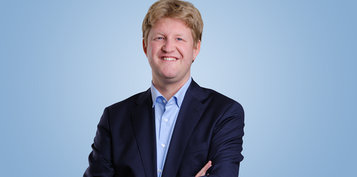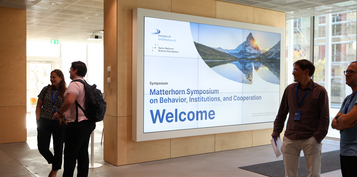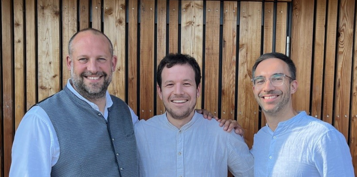Prof. Dr Michael Kurschilgen
Michael Kurschilgen has been an Assistant Professor at UniDistance Suisse since 2022, after holding positions at the Technical University of Munich and the Max Planck Institute in Bonn. He received his PhD in economics from the University of Jena as part of a Max Planck Graduate School in 2013. He has been a visiting researcher at Stanford University, UC Berkeley, the University of Michigan, EUI Florence and the University of Bologna.
News


Diligentia Foundation Funds Research Project at FernUni Schweiz on Administrative Barriers in the Tax System

“UniDistance Suisse is an attractive institution in the field of high-level scientific research”

Congratulations to Christoph Drobner on his appointment at CEU

1st Matterhorn Symposium on Behavior, Institutions, and Cooperation

How do moral appeals influence people’s fairness judgments?
Publications
Working Papers
Identity and Economic Incentives
with Kwabena Donkor, Eugen Dimant, Lorenz Goette, and Maximilian Mueller
Why Do People Take Turns?
with Ola Andersson, Carlos Kurschilgen, and Daniel Spiro
Pretentious but Meaningful? Experimental Evidence on the Value of Prosocial Signals
with Julia Holzmann and Magnus Strobel
Published Papers
Norms as obligations
2024, International Review of Law and Economics, 81, 106235
with Leonard Hoeft and Wladislaw Mill
Moral awareness polarizes people’s fairness judgments
2023, Social Choice and Welfare, 61, 339–364
Does the threat of overthrow discipline the elites? Evidence from a laboratory experiment
2022, Journal of Legal Studies, 51 (2), 289-320
with Konstantin Chatziathanasiou and Svenja Hippel
Revival of the Cover Letter? Experimental Evidence on the Performance of AI-driven Personality Assessments
2022, International Conference on Information Systems (ICIS), 1285
with Christoph Kecht and Magnus Strobel
Echo chambers and opinion dynamics explain the occurrence of vaccination hesitancy
2022, Royal Society Open Science, 9, 220367
with Johannes Müller and Aurélien Tellier
Managing Expectations: How selective information affects cooperation and punishment in social dilemma games
2021, Journal of Economic Behavior and Organization, 187, 111-136
with Christoph Engel and Sebastian Kube
- featured in Handelsblatt, Frankfurter Rundschau, Bild der Wissenschaft, Badische Zeitung, Cordis
Property, Redistribution, and the Status Quo: A laboratory study
2021, Experimental Economics, 24, 919-951
with Konstantin Chatziathanasiou and Svenja Hippel
The fragility of a nudge: The power of self-set norms to contain a social dilemma
2020, Journal of Economic Psychology, 81,102293
with Christoph Engel
Communication is More than Information Sharing: The Role of Status-Relevant Knowledge
2019, Games and Economic Behavior, 113, 651-672
with Isabel Marcin
- featured in Forschung & Wissen, FehrAdvice Blog, Max-Planck-Society
Internal conflict, market uniformity, and transparency in price competition between teams
2017, Journal of Economic Behavior and Organization, 144, 121-132
with Alexander Morell and Ori Weisel
- featured in LatestThinking
First impressions are more important than early intervention: Qualifying broken windows theory in the lab
2014, International Review of Law and Economics, 37, 126-136
with Christoph Engel, Martin Beckenkamp, Andreas Glöckner, Bernd Irlenbusch, Heike Hennig-Schmidt, Sebastian Kube, Alexander Morell, Andreas Nicklisch, Hans-Theo Normann, and Emanuel Towfigh
The Coevolution of Behavior and Normative Expectations: an Experiment
2013, American Law and Economics Review, 15(2), 578-609
with Christoph Engel
Fairness Ex Ante & Ex Post: Experimentally Testing Ex Post Judicial Intervention into Blockbuster Deals
2011, Journal of Empirical Legal Studies, 8(4), 682–708
with Christoph Engel
- featured in JOTWELL
Published Comments
Why do Judges Grant Rehearing Requests? Evidence from the Supreme Court of Israel: Comment
2023, Journal of Institutional and Theoretical Economics, 179, 27-31
Coercion and Consent: Comment
2014, Journal of Institutional and Theoretical Economics, 170(1), 79-82
Discretion, Productivity, and Work Satisfaction: Comment
2013, Journal of Institutional and Theoretical Economics, 169(1), 23-25
Disclosure, Agents, and Consumer Protection: Comment
2011, Journal of Institutional and Theoretical Economics, 167(1), 77-79
Other Publications
Reproducibility in Management Science
2023, Management Science, forthcoming
Fišar, M., Greiner, B., Huber, C., Katok, E., Ozkes, A., and the Management Science Reproducibility Collaboration. Member of the Management Science Reproducibility Collaboration.
Research focus
His research lies at the interface between economics, psychology and law. In his research, Prof. Dr. Kurschilgen combines behavioral microeconomic theory with laboratory experiments, field experiments, and other empirical approaches. His work shows, among other things, that property rights are more secure when redistribution is mandatory (rather than voluntary); and that the human need for social recognition is a key reason why citizens may trust the recommendations of scientific experts.
Research groups
Behavioral Economics and Institutional Design
Faculty of of Business and Economics
Teaching
| M101-F |
Microéconomie
Bachelor of Science in Business and Economics
Microéconomie Programme court en Economie politique |
| M101-D |
Mikroökonomie
Bachelor of Science in Business and Economics
|
Functions at UniDistance Suisse
Faculty of of Business and Economics
- Vice-dean
- Programme direction for the Bachelor in Business and Economics (French and German)
- Assistant Professor
Faculty Council of Business and Economics
- Vice-dean
- Programme direction for the Bachelor in Business and Economics (French and German)
- Assistant Professor
Behavioral Economics and Institutional Design
- Assistant Professor
Academic Council
- Representative for professors


